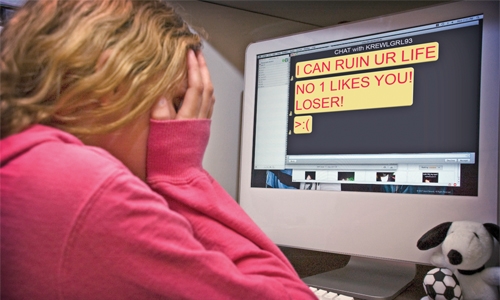Should we remain silent while we are bullied online?
Manama : The word bullying instantly takes us back to our school days. Bullying is most commonly associated with children and it is true that children are the most common victims of it. Needless to say this does occur among adults too.
There have been numerous cases where we hear of children’s Facebook accounts being hacked, though mostly it’s done as a prank by their peers. The trouble doesn’t lie there as this is the least concerning case of cyber-bullying. However, there are several impersonation cases, wherein fake accounts are created for the sole purpose of hurting an individual.
What makes it so dangerous is the fact that it can happen to anyone and it is very hard to identify the source unless some professional help is sought out. It can be done by posting a rumour, gossip or even go as far as personally singling out a person online and putting up a defaming or humiliating material about them. But it is important to know that it’s not impossible to fight against it.
DT News asked a few people on their personal opinion on cyber-bullying. Here are some of the responses we got:
“I’ve personally never gone through cyber-bullying, but I have a friend who recently fell victim to it. It was a faceless person and we had no means of finding out who it was. We had no clue about how to stop it. The bullying stopped after a while, but it was a very helpless period in our lives,” recalled Sales Executive Anton Charles.
Meanwhile, a student, Nikita Menon, said, “A friend of mine experienced this on a gaming website. Another user started saying mean things to her and she naturally got defensive. Her defensiveness in turn spurred the other user on and started to threaten her. Turns out he was a hacker and the words he used really affected my friend’s mentality. In the end, she just decided to let it go and decided to delete her account.”
Another student Gabriella Liandu said, “Bullying comes in many forms, but the one I find most shocking is cyber-bullying. The fact that an anonymous person can have the power to affect the wellbeing of someone else negatively on any online platform is just ridiculous. It’s 2016; the Internet is so accessible nowadays. I myself have encountered various forms of cyber-bullying in my time, but nothing so extreme as to drive me away from my goals or my motives. I run my own YouTube channel so it’s natural that people will have opinions on what I post and people will sometimes feel entitled to share that opinion no matter how horrible it is.
“When you put yourself out there, there’s no way that you won’t be judged in some way. The fact that people are keeping up with you and wanting to see what you’re doing all the time is definitely a form of admiration, no matter how hard they try to disguise that with words of jealousy or hate speech. I say, just do what works for you. It’s working for me, and I love what I’m doing and how I connect with people online; there’s always more of good to be said than bad.
“Cyber-bullying can be stopped if we just don’t take it to heart and focus on spreading positivity. Know yourself and your worth. Words can only hurt when you let them, so don’t give them that power. Don’t let the bullies win!” she added.
DT News also consulted on an expert advice from Pius Mathew, HOD of Computer Science, Indian School Bahrain.
“To harass, threaten, embarrass, or target another person with the use of technology is what called cyber-bullying. It normally occurs among young people/ kids who have access to a phone, computer, or other devices. Kids who are bullied and the bullies themselves are at a higher risk for suicidal thoughts, attempts, and completed suicides,” he said.
Sharing a few suggestions to share, Pius added, “Parents can help their wards by offering comfort and support in various ways:
- Talking about any bullying experiences you had in your childhood might help your child feel less alone.
- Let your child know that it’s not his or her fault, and that bullying says more about the bully than the victim.
- Appreciate your child for doing the right thing by talking to you about their experience.
- Remind your child that he or she isn’t alone and that a lot of people get bullied at some point.
- Let someone at school (the principal, school nurse, a counsellor or teacher) know about the situation.
- Encourage your child not to respond to cyber-bullying, because doing so just fuels the fire and makes the situation worse.
- But do not delete the threatening messages, pictures, and texts, as these can be used as evidence with the bully’s parents, school, employer, or even the police. You may want to save, and print screenshots of these to be used in the future.
Other ways to avoid include blocking the bully; limiting access to technology; knowing your kids’ online world; adding your child as “friend” or “follow” them on social media sites (but do not abuse this privilege by commenting or posting anything to your child’s profile); Encouraging them to safeguard passwords and to never post their address or whereabouts when out and about,” Pius Mathew added.
So what can we do in the end? In three simple terms educate yourself, educate others and speak out. It’s time to let the bullies know that they can’t overpower us anymore. Instead of taking on the unacceptable behaviour, help yourself and report the bully.
Related Posts

